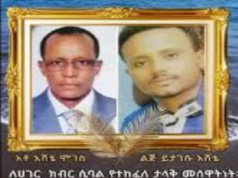As political prisoner, party leader and eminent surgeon, he fought for the unity of Ethiopia
During the dark years of the military communist regime of President Mengistu Haile-Mariam (1974-1991), Asrat continued his medical and university practices. During the 1984-86 famine, his surgical skill saved the life of the Guardian correspondent, Jonathan Steele, who described the event in an eloquent article in the Guardian Weekend magazine last November.
Following the Eritrean-Tigrayan overthrow of Mengistu in 1991 and the independence of Eritrea, the Tigrayan-dominated government increasingly purged members of the Amhara ascendancy, which had dominated the Haile Selassie and Mengistu regimes. Asrat was among 21 Amhara professors dismissed from the university in 1993. In that year he became founder-chairman of the All Amhara People’s Organization (AAPO), dedicated to bringing back the unity of Ethiopia prior to Eritrean independence and the protection of Amhara interests under the ethnically-based constitution of president (now prime minister) Meles Zenawi.
Although AAPO remained nominally legal, its relations with the Meles government deteriorated and in June 1994 Asrat was arrested. He was imprisoned for two years on charges of planning violence against the state, although Amnesty International and other independent observers pronounced the evidence against him dubious and unsafe, and Asrat was on record as condemning violence for political ends. Further convictions followed, each on similarly unsatisfactory evidence, extending his sentence to five years. In 1996 he faced a new trial, repeatedly adjourned and never completed, clearly signalling the government’s intention to keep him in prison beyond the expiry of his existing sentences.
By now in his late 90s, and with a heart by-pass, Asrat was incarcerated in a communal cell but forbidden to communicate with his fellow prisoners – a refined form of solitary confinement. His health deteriorated and in January 1998 he was transferred, under armed guard, to his old hospital, Tikur Anbessa (Black Lion). By November he was in intensive care. Medical details were kept secret, but news of his heart condition, the onset of diabetes, high blood pressure, deteriorating eyesight and a suspected blood clot on the brain caused growing anxiety. His government-appointed doctors reportedly said that to survive, Asrat needed treatment not available in Ethiopia.
On (western) Christmas Day, 1998, the government finally yielded to international appeals for him to be allowed to go abroad for treatment. Asrat was flown to London and then to Houston, Texas. He appeared to recover, but suffered relapses and died at the hospital of the University of Pennsylvania after less than five months of freedom.
Asrat was a man of great dignity and courtesy, stubborn to the point of cussedness, arguably politically naive. Throughout his five years’ harsh imprisonment, Amnesty International, with other humanitarian organizations and numerous individuals, including now elderly Scottish doctors, campaigned for his release. Until very late, however, western governments, whose intervention might have carried weight with the Meles government, refused to go beyond occasional expressions of concern, apparently fearing to irritate a regime which, despite obvious shortcomings, was pro-western and a vast improvement on its predecessor.
It is hard to avoid the conclusion, though, that if those governments had worked harder and earlier, they might have averted the premature death of the most distinguished, and one of the most courageous, Ethiopians of our time.
Asrat Woldeyes, doctor and politician, born June 12, 1928; died May 14, 1999
Source: The Guardian

























